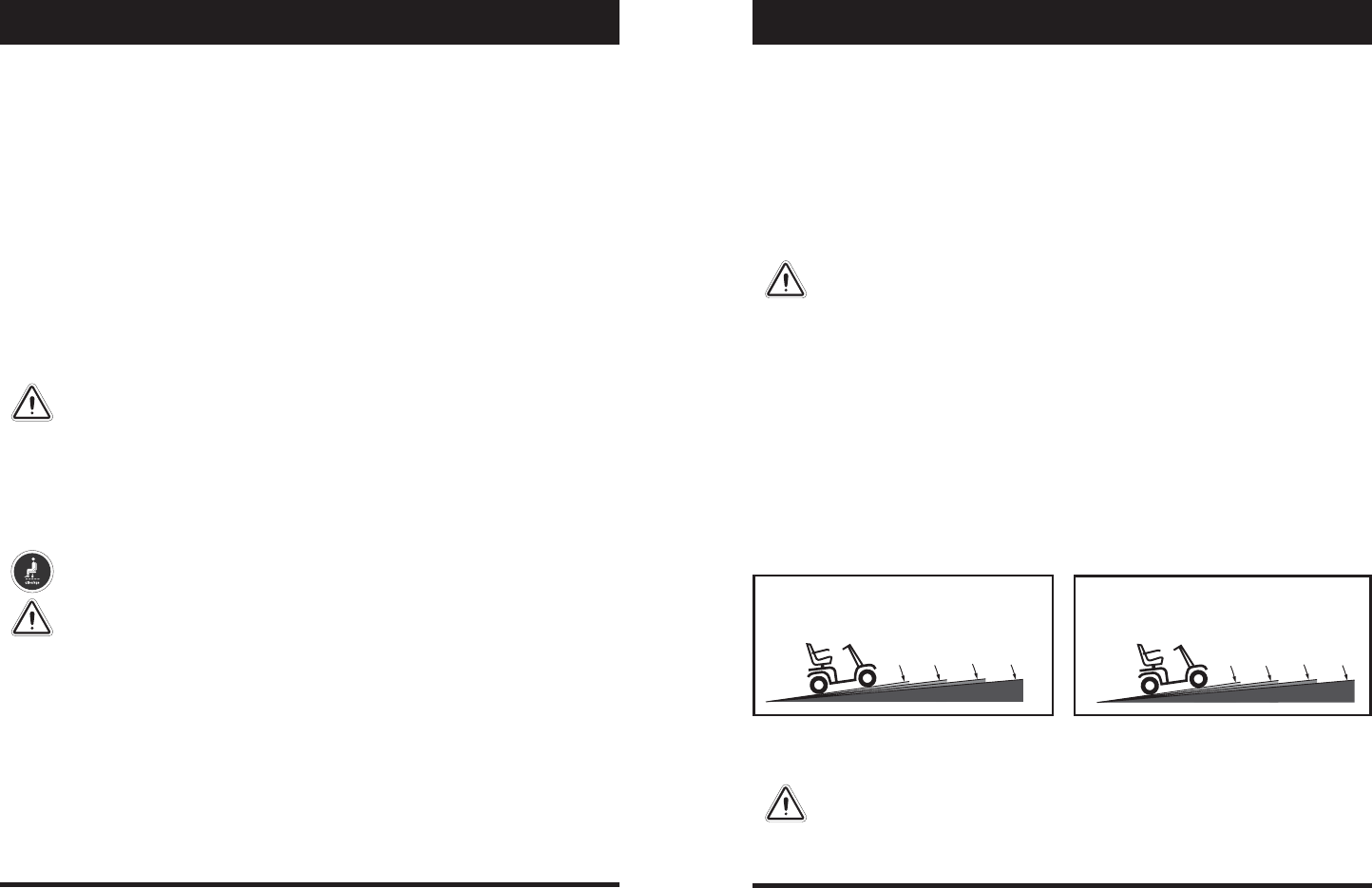
10
11
Legend www.pridemobility.com
www.pridemobility.com Legend
II. SAFETY
WARNING! Any attempt to climb or descend a slope steeper than what is shown in figures
1 and 1A may put your scooter in an unstable position and cause it to tip.
WARNING! Never carry an oxygen tank weighing more than 15 lbs. Never fill the front or
rear basket with contents exceeding 15 lbs.
When climbing an incline, try to keep your scooter moving. If you must stop, start up again slowly, and then
accelerate cautiously. When driving down an incline, do so by setting the speed adjustment dial to the slowest
setting and driving in the forward direction only. If your scooter starts to move down the incline faster than you
anticipated or desired, allow it to come to a complete stop by releasing the throttle control lever. Then push the
throttle control lever forward slightly to ensure a safely controlled descent.
WARNING! When climbing an incline, do not zigzag or drive at an angle up the face of the
incline. Drive your scooter straight up the incline. This greatly reduces the possibility of a
tip or a fall. Always exercise extreme caution when negotiating an incline.
WARNING! Do not drive your scooter across the side of an incline or diagonally up or down
an incline; do not stop, if possible, while driving up or down an incline.
WARNING! You should not travel up or down a potentially hazardous incline (i.e., areas
covered with snow, ice, cut grass, or wet leaves).
WARNING! When on any sort of an incline or decline, never place the scooter in freewheel
mode while seated on it or standing next to it.
WARNING! Even though your scooter is capable of climbing slopes greater than those
illustrated in figures 1 and 1A, do not, under any circumstances, exceed the incline
guidelines or any other specifications presented in this manual. Doing so could cause
instability in your scooter.
Handicap public access ramps are not subject to government regulation in all countries, and therefore do not
necessarily share the same standard percent of slope. Other inclines may be natural or, if man-made, not designed
specifically for scooters. Figures 1 and 1A illustrate your scooter’s stability and its ability to climb grades under
various weight loads and under controlled testing conditions.
These tests were conducted with the scooter’s seat in the highest position and adjusted rearward on the seat base
to its farthest rearward position. Use this information as a guideline. Your scooter’s ability to travel up inclines is
affected by your weight, your scooter’s speed, your angle of approach to the incline, and your scooter setup.
Figure 1. (3-wheel) Maximum Recommended
Incline Angles
Figure 1A. (4-wheel) Maximum Recommended
Incline Angles
II. SAFETY
Perform the following inspections prior to using your scooter:
! Check for proper tire inflation (if equipped with pneumatic tires).
! Check all electrical connections. Make sure they are tight and not corroded.
! Check all harness connections. Make sure they are secured properly.
! Check the brakes.
! Check battery charge.
If you discover a problem, contact your authorized Pride Provider for assistance.
TIRE INFLATION
If your scooter is equipped with pneumatic tires, you should check or have the air pressure checked at least once
a week. Proper inflation pressures will prolong the life of your tires and help ensure the smooth operation of your
scooter.
WARNING! It is critically important that 30-35 psi tire pressure be maintained in pneumatic
tires at all times. Do not underinflate or overinflate your tires. Low pressure may result in
loss of control, and overinflated tires may burst. Failure to maintain 30-35 psi tire pressure
in pneumatic tires at all times may result in tire and/or wheel failure.
WARNING! Inflate your scooter tires from a regulated air source with an available pressure
gauge. Inflating your tires from an unregulated air source could overinflate them, resulting
in a burst tire.
WARNING! When changing a tire, remove only the center lug nut, then remove the wheel.
If any further disassembly is required, deflate the tire completely or it may explode.
WEIGHT LIMITATIONS
Your scooter is rated for a maximum weight capacity. Refer to the specifications table for information.
MANDATORY! Stay within the specified weight capacity of your scooter. Exceeding the
weight capacity voids the warranty. Pride will not be held responsible for injuries and/or
property damage resulting from failure to observe weight limitations.
WARNING! Do not carry passengers on your scooter. Carrying passengers on your scooter
may affect the center of gravity, resulting in a tip or a fall.
INCLINE INFORMATION
More and more buildings have ramps with specified degrees of inclination, designed for easy and safe access.
Some ramps may have turning switchbacks (180-degree turns) that require you to have good cornering skills on
your scooter.
! Proceed with extreme caution as you approach the downgrade of a ramp or other incline.
! Take wide swings with your scooter around any tight corners. If you do that, the scooter’s rear wheels will
follow a wide arc, not cut the corner short, and not bump into or get hung up on any railing corners.
! When driving down a ramp, keep the scooter’s speed adjustment set to the slowest speed setting to ensure a
safely controlled descent.
! Avoid sudden stops and starts.
6˚ (10.5%)
250 lbs.
5˚ (8.7%)
300-350 lbs.
7˚ (12.3%)
200 lbs.
8˚ (14.1%)
150 lbs.
6˚ (10.5%)
250 lbs.
7˚ (12.3%)
200 lbs.
8˚ (14.1%)
150 lbs.
9˚ (15.8%)
150 lbs.
